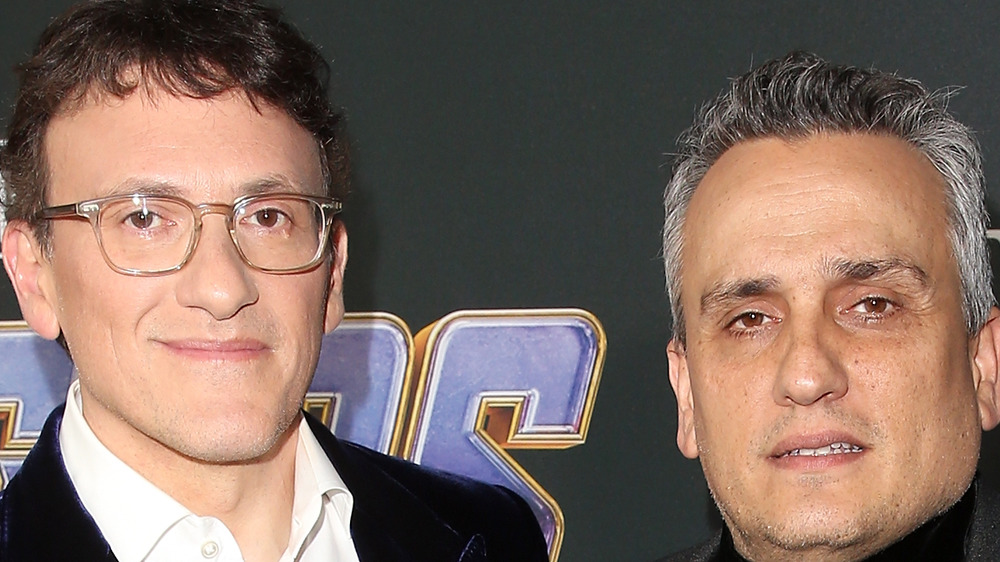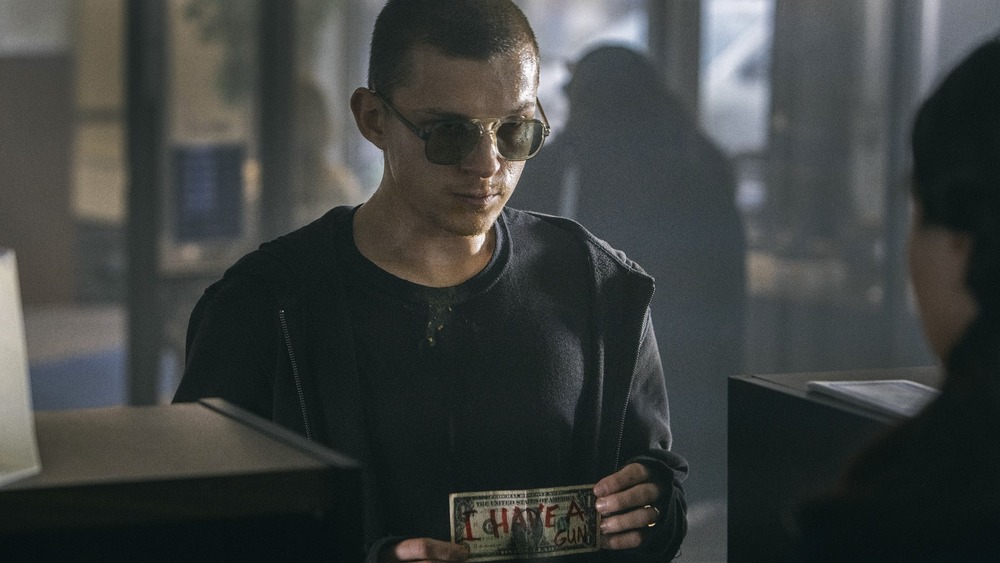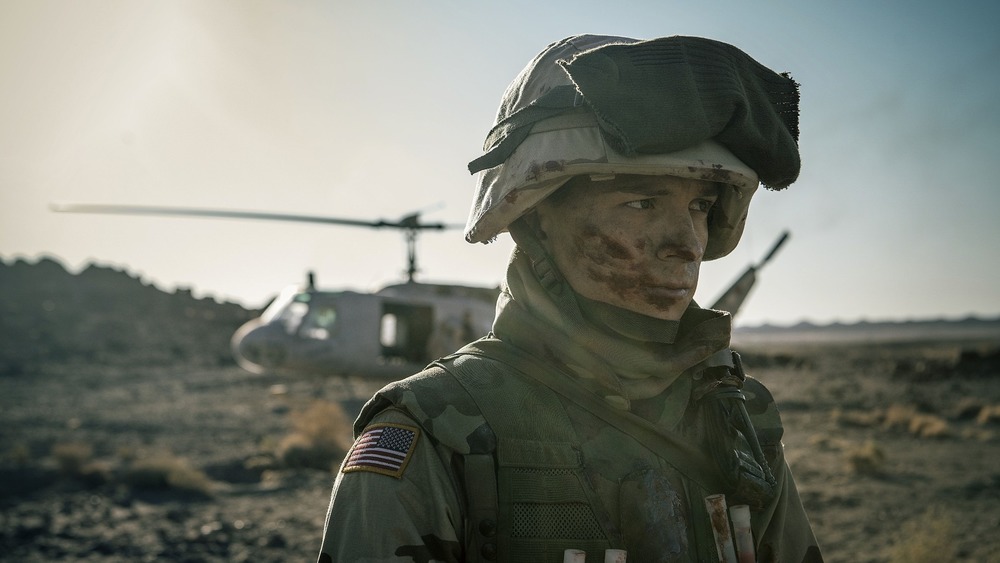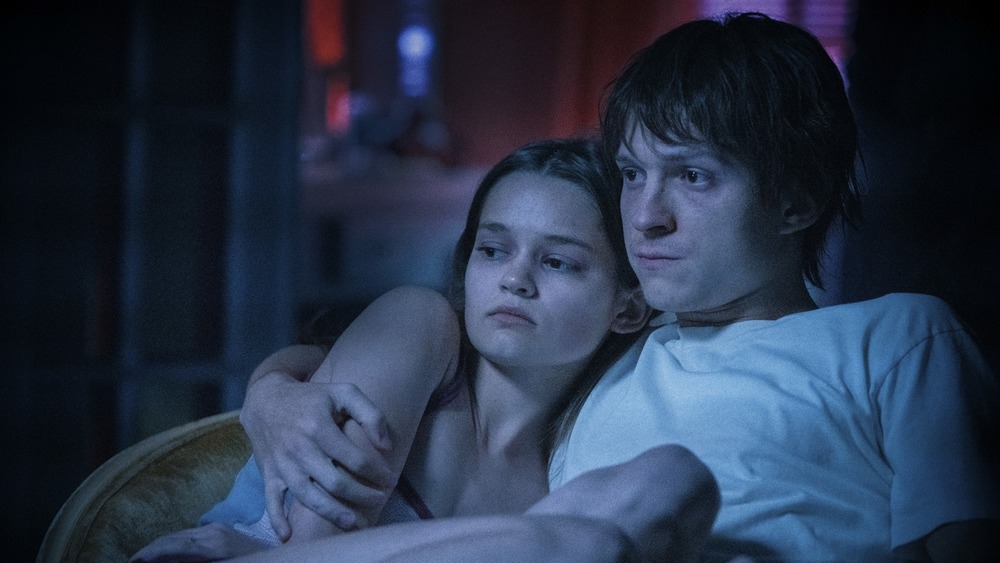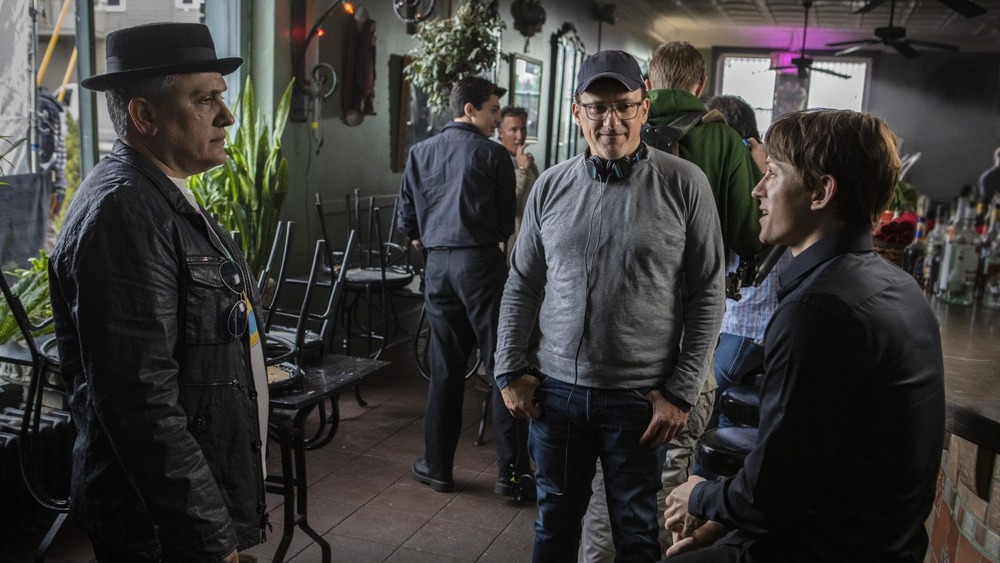The Russo Brothers Take Us Inside The World Of Cherry - Exclusive Interview
Nearly two years after their emotionally charged superhero opus Avengers: Endgame was released in theaters — and went on to collect nearly $2.8 billion in ticket sales — sibling filmmakers Anthony and Joe Russo are back behind the camera for the crime drama Cherry.
The film stars a very familiar face from the Russos' films in the MCU, Tom Holland, playing a decidedly different role than anything his Spider-Man fans are used to seeing him in. Holland plays Cherry, a disenfranchised young man whose life goes into a complete tailspin when he suffers from PTSD after returning home from his service with the U.S. Army in the Iraq War. Unable to shed the horrific images of some deeply personal casualties he witnessed in Iraq, Cherry turns to opioids to ease his pain, and his inability to overcome his addiction drives his wife Emily (Ciara Bravo) to become an addict as well. But when Cherry and Emily's drug habit moves from opioids to heroin and they have no money to pay for it, the tormented veteran turns to robbing banks and encountering a menacing drug lord who will kill them if they can't settle a massive debt.
Taking time from their busy schedule (the brothers work non-stop, and in fact produced four films in between Endgame and Cherry, including the Netflix features Extraction and Mosul), the Russos chatted with Looper in an exclusive interview about Cherry, their continuing work with Holland, and the true-life horrors of their new film's narrative. Cherry, based on the best-selling semi-autobiographical novel of the same name by Nico Walker, is playing in select theaters and debuts on AppleTV+ March 12.
The Russos say they knew Tom Holland had range from the time they met him
Cherry sees Tom Holland go to some places, dramatically, that we've never seen him go before. With Captain America: Civil War and the Avengers films that you guys did, we got to experience the heroic moments, that youthful innocence, and loss and vulnerability. Cherry, though, really takes Tom into really dark place. I am wondering if there was a point of working with Tom in the MCU where you both had a realization that if you were looking for an actor that really needed to go to dark places, Tom would be the guy.
Joe Russo: Certainly, at his audition [to play Spider-Man]. When we walked into an audition for Peter Parker, I think he was 19 years old at the time. And we'd seen hundreds of actors for the role. And he had this charisma and this energy, but it was also very confident and a really hard worker. He went to an arduous audition process for that role and every time he came back, he worked even harder than he did the last time. And that impressed us about him. He had a work ethic that was valuable. And then working with him on set, he's very facile, he's very easy to direct, he's open and fearless, he's willing to try anything; certainly at that moment [after the Snap by Thanos in Avengers: Infinity War] when he falls into Robert Downey's arms and disappears, it seemed to break everyone's hearts.
What's clear to us is that there's a lot of compassion and empathy around him as an actor. So when we read the book, we knew it was going to be a very difficult movie for people to watch. And we don't like when people intellectualize the experience. We're filmmakers and would prefer the audience to have an emotional experience while they're in the theater, and you'll intellectualize it if it's too difficult to watch. If you aren't empathizing with the lead character, it will become a study for you rather than an emotional experience. And we knew that Tom could engender that kind of empathy that's required to take the audience on a really dark journey like this.
Cherry confronts the trauma of violence, the Russos say
I talked with you guys briefly for Mosul at a round table, and you're finding yourself back in the war zone for Cherry. And I'm wondering, what is it about war films that compels you to make them? Now, obviously Cherry isn't a war film through and through, but obviously pivotal parts of the film are set in war. I can't help but think for you two the appeal as filmmakers is not so much about the physicality of war or the physical damage, but the war that rages on in the heads of these soldiers when they come home — and we get to see that here, and then we see Cherry go down that deep dark rabbit hole as a result. Would that be true?
Anthony Russo: Yeah. I think, yeah, you're putting your finger on it. I mean, look, neither Joe nor I have ever served militarily, but we have been fascinated with that experience through our entire lives through literature, journalism, [and] film — we've made a study of it. And it's an extreme human experience and it has to do with the trauma of violence. The trauma of violence I think it's relatable for all of us, whether or not you've served in the military, but violence is something, when you experience violence, it's something that can't be undone very easily, and it lives in people. There's a variety of ways that people have to deal with it once they've experienced that level of violence. And I think it's sort of understanding that human relationship to violence and trying to find ways of coping with it, and the various ways we cope with it that's fascinated us because it is an element of modern life. We experience it in different ways. Sometimes in the form of warfare, but also other ways far short of that. So, I think that at the end of the day, it's a great proxy for a lot of traumatic experiences that we experience and how the human psyche deals with those things.
Well, I think the film really presents a conundrum in this sort of way, because obviously you don't want to see anybody turning to crime. And I have a tremendous empathy being from a military family myself, for soldiers going through PTSD. But this film, it gives me an understanding why veterans suffering from PTSD go down the path of addiction. It produces an empathy that maybe I didn't quite have before. What it really comes down to is a conversation that we really need to have about when people do turn to addiction, and in this case, again, it's PTSD.
Joe Russo: One hundred percent. I mean, there are underlying mental health issues that are not being addressed. Most of the people are self-medicating for depression. Technology and social media are driving depression numbers higher and higher every day, so we have an epidemic of mental health issues as well. And the problem with those [drugs] is that they're cheap, they are scientifically engineered to make you addicted to them and they're easy to get on the street. And if you want to self-medicate, it's a very easy way to do it and it's an addictive high.
As one of our ex-addicts who was a consultant told us, "Once you're hooked on heroin, all you care about is where you're getting more heroin." That's it. In a lot of ways, it simplifies your life, right? [An addict thinks] "All I care about is the next fix. All the issues that I had have gone away, and the only thing I care about is loving myself continuously." And I think the only thing that's going to break the cycle is empathy and treating this like a disease and not like a crime. And that's the tricky part of the film, right? Because throughout the thing, [Cherry] doesn't hurt anyone, even though he's threatening [people] in the robberies, but in real life, Nico Walker, the author of the book, did not hurt anyone.
The Russos say Cherry also confronts various systems
I have to say, I think this film is an indictment on the VA, maybe, to an extent, where the psychiatrists or psychologists haphazardly prescribed Oxycontin to Cherry. I don't feel like the soldiers are getting 100% of the attention they need. But I also feel that the film an indictment, in a way, of big banks, because obviously when you see the name of the banks in Cherry — "S—-y Bank" or "Bank F—s America" — you have to almost believe that a finger is being pointed at them, too.
Anthony Russo: Yeah. I would point out, too, while the incident in the movie is specific to the VA, that experience of being mis-prescribed there to treat problems that aren't going to be fixed by opioids was a problem throughout the wider medical community, and that's not specific and unique to the VA. There were a lot of problems, both with the medical industry and the pharmaceutical industry, in terms of how that drug was being pushed in used and abused by the system.
But I think that abuse by the system is really what is at the heart of the big question that you're talking about. I mean Cherry is a young person who is coming of age, who's finding himself confronting these institutions, whether it be the medical industry, the banking system, the military, the prison system. And how do these institutions relate to him as an individual who they respect who he is, and they support who he is? Are they friendly to who he is, or are they hostile to who he is? Can he trust them? And I think that's a big question in this country. Can we trust any social institutions that are enclosed and help support us on an individual level? And what happens when we can't trust them? What happens when they misinterpret information like Cherry being prescribed opioids to deal with PTSD?
Also, what happens when you're a young person and you have a proper bank that sort of made a mistake in your account and you go there to try to correct it. And you're dealt with in the ways bureaucracy often deal with people without caring in that very way. And this affects people, and it takes away their power or their autonomy. So to a large degree, we're exploring how it individual survives an environment that's somewhat hostile to them and not supporting them in the proper way. What do you do about that? How do you go forward?
The Russos are open to returning to the MCU in either film or TV
Guys, I just want to wrap it up by asking something Marvel-related — WandaVision is a smash hit and whether you guys like it or not, you're connected, and I'm sure you love it! But with WandaVision being a TV series, it brings more depth and complexity to the Marvel tales than we've seen before. Have you been watching the series, and do you possibly want to, at some point, maybe dip back into the Marvel Universe, but taking the television route?
Anthony Russo: We have been watching and really enjoying the series. I have to admit I'm a couple of episodes behind right now to my daughter's English because she loves to talk about the show. But yeah, look, we love the MCU, we love the great narrative experiment that it has been. We're very proud of our work that we've done in the MCU and grateful for that opportunity and we love Marvel. The people there are among the finest collaborators we've come across in our type of work. So, yeah, we would be happy to go back and work with Marvel again on the right project, whether it be in theaters or on television.
We love both formats equally, we recognize that there are unique opportunities at a creative level to be explored both mediums and we value them. We don't have any concrete plans that we can speak to on that level. But I'll tell you this: After having worked in the MCU for seven consecutive years, delivering four films and always having to think about where the story was going, what would happen next to the MCU, It's very fun for Joe and I to just be fans right now, and enjoy it as fans.
